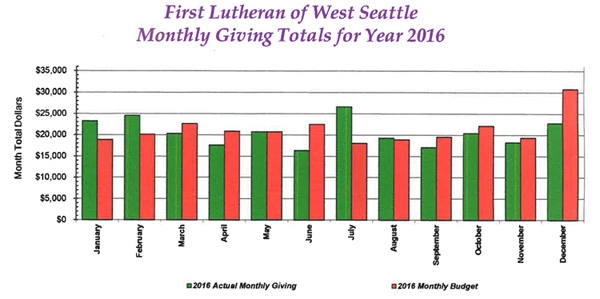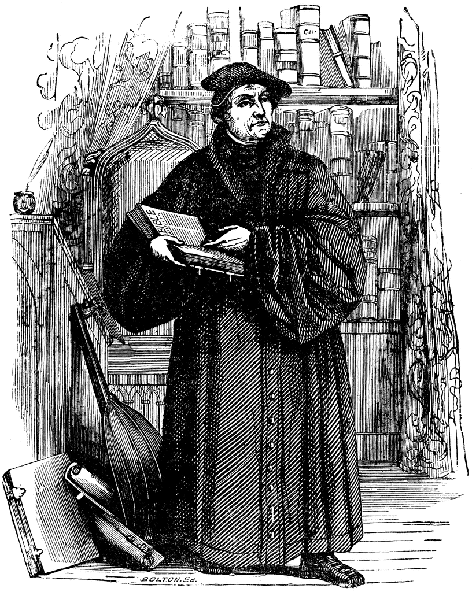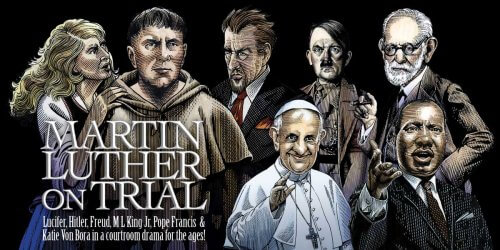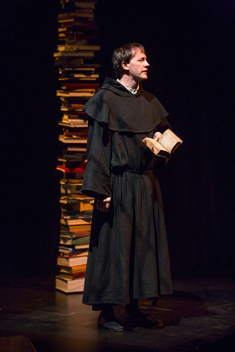February 2017
God’s Wrath ________________________________________________________________________________________________________________________________________
Learning to Fear God
Matthew 10:28 tells us to fear God and Psalm 34:11 says we’ll
need to learn how to do that. A good place to learn this is in
the following passage from Martin Luther:
There you go – that pretty much covers it. Note first the
devastation. Wrath leaves no room for mercy – everything is
burned up, nothing is spared. Next note it’s a vengeful wrath –
based on our godless provocations. So God’s no terrorist –
mangling innocent people at sidewalk cafés. We deserve what we
get. Finally it’s bivalved – attacking suddenly and also slowly.
Quickly our confidence is taken from us and we sink into a
fixed, deep despair. And more gradually we also waste away in
pain and misery, watching our skin and bones crack up
irreparably.
Knowing this, don’t you think, makes even sweeter the words in
Romans 5:9, about being saved from the wrath of God by the blood
of Christ? I would hope so... —Pastor Marshall |
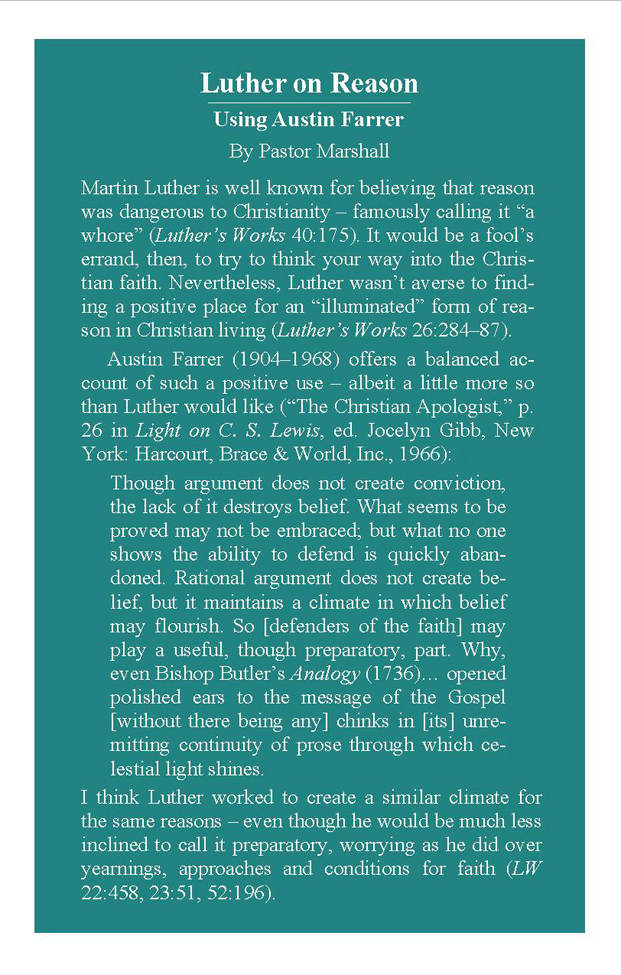 |

PRESIDENT'S REPORT....by
Earl Nelson
As I look forward to 2017 this January I am giving thanks for
two things primarily: that after his successful knee surgery
Dean Hard will probably be walking with much less discomfort,
and that 2017 is the 500th Reformation Anniversary.
Dean's knee surgery is of great importance for our church
as a whole. We all
see and hear his work with the liturgy in church, but he is also
invaluable in the day-to-day operations of the church including
the maintenance of the Church buildings and grounds, over which
he watches lovingly.
Give thanks to God for this successful operation and pray
for the continued recovery of our church deacon.
Reformation 2017 in our church will be important in at least two
ways. In the first
place, our church's celebration of the 500th year of the
Reformation will be extraordinary in its faithfulness to the
original message of Martin Luther and the spirit of the
Reformation, which was that the Church must remain steadfast in
giving voice to the Word of God and to the Holy sacraments and
not add, change, modify, and otherwise adapt God's clear words
and intent for the Church to our own fallen and sinful ways.
Where does it say in Scripture that becoming a new
Creation in Christ is easy?
Secondly, it gives us the opportunity and occasion, as we
celebrate the faithfulness of Martin Luther and the reformers,
to pray for, to hope for, and to act for the renewal of God's
Church, the body of Christ, today in America and the Western
world, where it languishes in self-satisfied prosperity,
spiritual sloth, and intellectual decadence.
|
Stewardship
_________________________________________________
Being the Salt of the Earth
Christians are supposed to be the salt of the earth (Matthew
5.13). We are
supposed to try and make the world a better place.
There is so much suffering in the world.
Even if we don’t see much of it in West Seattle that
doesn’t mean it isn’t all around us.
So we have a lot to do.
If we’re not looking for it we can easily miss it because
our comfortable lives blind us from it.
But it’s out there – close at home and in places far
away. So it isn’t
something we can get done on the weekends.
It requires our full devotion.
This is one reason we give money to the church.
By supporting the church we help each other become the
salt of the earth through the education and worship we provide.
So when you put your money in the plate don’t think it’s a small
thing. It’s one
more way we have of turning us all into the salt of the earth.
It’s one more way we have of helping make the world a
better place.
—Ruth
Harty Marshall (May
2005)
Submitted by Jane Harty, Church Council
Month (December)
Year to date (Jan-December)
Budget
$30,762
$254,235
Received
$22,736
$245,881
|
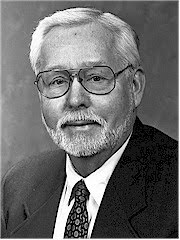
Forde Preaching
By Pastor Marshall
Dr. Gerhard O. Forde (1927–2005) was a prominent Lutheran
scholar at Luther Seminary in Saint Paul, Minnesota (see
The Messenger,
September 2005 and December 2014). His widow, Marianna Forde,
has just published a new collection of twenty-four sermons,
We Preach Christ
Crucified: Sermons of Gerhard O. Forde (Minneapolis:
Lutheran University Press, 2016).
My favorite one is the first, “Without a Card.” I
remember the day he preached it at the seminary during my senior
year in 1975 – as if it were just yesterday. It caused quite a
stir that lasted for days afterwards. The sermon is about
creation in light of Psalm 19:3 – where “there is no speech” –
no message, no greeting card, as it were. The point of the
sermon is that creation – depicted as a mysterious bouquet of
flowers without any greeting card – is just a gift from God for
us to enjoy and care for. It doesn’t have any secret meaning
about God or the world for us. Because it doesn’t, Jesus had to
come to reveal that missing truth to us. So in that sense,
Christ is “the card on the bouquet” – which is how Forde ends
the sermon. All things were created through him and for him
(Colossians 1:17). Christ, through his death makes new creations
of us when we but believe in him (2 Corinthians 5:17). The
upshot of the sermon is that there is no revelation from God
apart from Jesus Christ and his death on the cross. Creation
reveals nothing to us about the meaning of it all. That’s what
upset so many who first heard it preached. I like to use this
sermon in my confirmation class when we go over creation in the
Book of Genesis. I think it’s a gem.
But I do have a few misgivings with this collection.
Chief among them is the conviction that Christ does not “force
himself upon us” (p. 22). It does seem, however, that this is
just what he did to Saint Paul on the road to Damascus when he
knocked him to the ground (Acts 9:4). Later Forde seems to
concede as much when he says Christ will break “down the
barriers, passing through the doors of doubt to come to us” (p.
88).
And on our first sin he twice says it is not so much a
fall as a climbing up – trying to be God, rather than falling
from an original state of perfection (pp. 25, 69). But in fact
we lost immortality through that first sin (Romans 6:23), and so
it’s not wrong to say we fell from grace. Finally the
unexplained wedding garment in Matthew 22:11 stands for
celebration over duty, Forde argues (pp. 18–19). But Luther saw
a law-gospel dialectic at work here instead. Those garments,
then, are a sign of repentance before the wedding celebration
begins (Luther’s
Works 79:223). One
would have thought that this favorite dialectic of Forde’s would
have resonated here for him – but it didn’t for some reason.
|
|
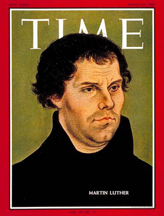 March 24, 1967
Another New Luther Book
By Pastor Marshall
The latest new translation of Luther’s sermons is volume 79 – which also includes a first ever English translation of a sermon on Ephesians 6 as Appendix A. Here are some of my favorite passages: “What strange ways these are! Those who diligently hold to the Law… are not those who keep the Law” (7); “Faith has fastened… together these two contrary parts – [sinfulness and forgiveness]” (13); “Reason knows nothing about the misery of our nature” (24); “A new, heavenly power of the Holy Spirit… presses Christ with His works into the heart” (29); “Prattlers… go on urging and afflicting with the Law; they leave the people stuck in their sins and mock at their harm” (31); “A Christians should not say – Who knows what verdict God in heaven will pronounce over me” (34); “The Law’s glory… should only shine until you are humbled and driven to desire the sweet face of Jesus” (36); “We cannot help ourselves [so God] must begin it in us” (62); “Prayer is as strong and firm as its faith is” (70); “Faith stands at a distance from God, and yet runs and calls to Him” (72); “There must be open, frank love and kindness toward everyone” (75); “[That] faith is in a person and does not work… is impossible” (75); “Where faith is correct, it certainly loves and acts towards others in love” (76); “Spiritual leprosy… is a thousand times worse [than] bodily leprosy” (79); “You have no other work… for salvation than that you believe, daily practice this faith, see to it that you remain steadfast in it, and do not let [anyone with a smooth tongue and good appearance] snatch you away from it” (79); “No one any longer knows the Christian life” (80); “When God seems to be farthest away, He is closest” (82); “The divine name must always… be the greatest cover for shame” (86); “We must guard ourselves against no one as much as against… the most learned” (88); “You need not try to find God… except where there is contempt” (93); “A Christian life surpasses the natural life” (93); “It requires effort to listen to the Gospel and also to act according to it” (101); “If I believe that I have a God, then I cannot worry about myself” (105); “Study [of the Bible] is my work” (106); “The world gives [Christians] nothing” (109); “A Christian…. should flee from…. the blindness and misery of the world” (111); “The Word of God…. stands and does not fall, as people fall and waver” (116); “Words do not cling only to the tongue and ears but come into force and become a work or activity” (120); “Now that we have this great, bright light [of the Gospel, people] do much less than before” (120); “Many have the Word, but few have the power that it would press forward, [and] give results” (124); “Love is the proof by which we test whether faith is real” (128); “Faith… sees nothing” (135); “A Christian… does not live on earth for himself or for his own sake [but for] his Lord Christ” (146); “Outside of [the Church] no one will be saved” (152); “Even in the saints not everything is perfect yet” (161); “Outside of the Church of Christ there is no God, no grace, and no salvation” (170); “In the life to come there will no longer be faith” (174); “Demonstrating the fruit of faith… is not so quickly done or accomplished” (182); “People…. need to be exhorted and urged through God’s word to a good life” (182); “[We must get] on their back and [force the lazy] to do it” (182); “A Christian [is called] to be a different man than he previously was” (183); “[A Christian cannot] remain in the old, former, unchristian way of life characterized by error and destructive desires” (184); “A Christian…. should be on his guard not to deceive himself” (190); “All sin is like a dry leaf [to a Christian]” (198); “We all were born in sin as God’s enemies” (198); “Sin is so grave that no creature can wipe it out [except] Jesus Christ, God and man” (199); “Crawl under and into Christ” (200); “[Jews] are forever stuck in God’s wrath and damnation” (210); “Shame on me because of my shameful unbelief, that my heart is not here full of laughter and eternal joy” (217); “ This man without wedding clothes [is] without repentance and the knowledge of his misery” (223); “[Having faith is not] kept so safe as if I had it in a locked box” (225); “The smaller faith is, the stronger the flesh is” (230); “Faith must always look to future things” (231); “What is important is not the beginning [of faith], but continuing… and increasing” (233); “[Without] temptation and persecution…. faith is not genuine” (234); “Faith is a fragile, delicate thing” (235); “Our hearts should always be in the situation as though we were beginning to believe today, and we should always have the same attitude toward the Gospel as if we had never heard it, and must begin each day” (236); “[The devil] seeks all kinds of cunning and attacks” (237); “Sink into one little word, and be content and secure in it” (240); “Christ… lets us be attacked, so that we increase in faith” (240); “It does not depend on how strong or small faith is, but that it remains” (240); “[We’re all] alone in the world” (242); “God is with us sooner than we would have thought” (242); “It is the nature of faith that it draws in other people” (243); “The greatest and highest work of faith is that [it witnesses]” (243); “People [who] sincerely believe the holy Gospel…. are very rare in the world” (245); “The greater, more learned… we are, the greater evildoers we become” (248); “It is surprising that the… sun still shines!” (250); “The world is already lost, and no admonition helps” (251); “Skill is necessary to stay with wicked people and not also become wicked” (252); “A Christian must not be such an inhuman creature that he does not care whether other people believe or not” (253); “Why should we complain… that so few earnestly receive God’s Word?” (253); “Many… abuse the gospel” (257); “The servant is captive and ensnared in his sins” (259); “The Gospel does not affect godless hearts” (260); “We cannot grasp the Gospel unless the conscience is previously distressed and miserable” (261); “Crawl to the cross” (261); “If you are to live, then you must have something to do” (261); “No one wants to live according to [the Gospel]” (262); “Many among us have become worse than they were before” (262); “The wiser [and] more pious… they are, the worse, more bitter, and more severe enemies of the Gospel they are” (269); “Only thieves” (292); “His only Son [becomes] a payment” (294); “[The world regards] Christians as the worst people” (295); “A Christian must be in a hard battle on every side,… even against himself”
|
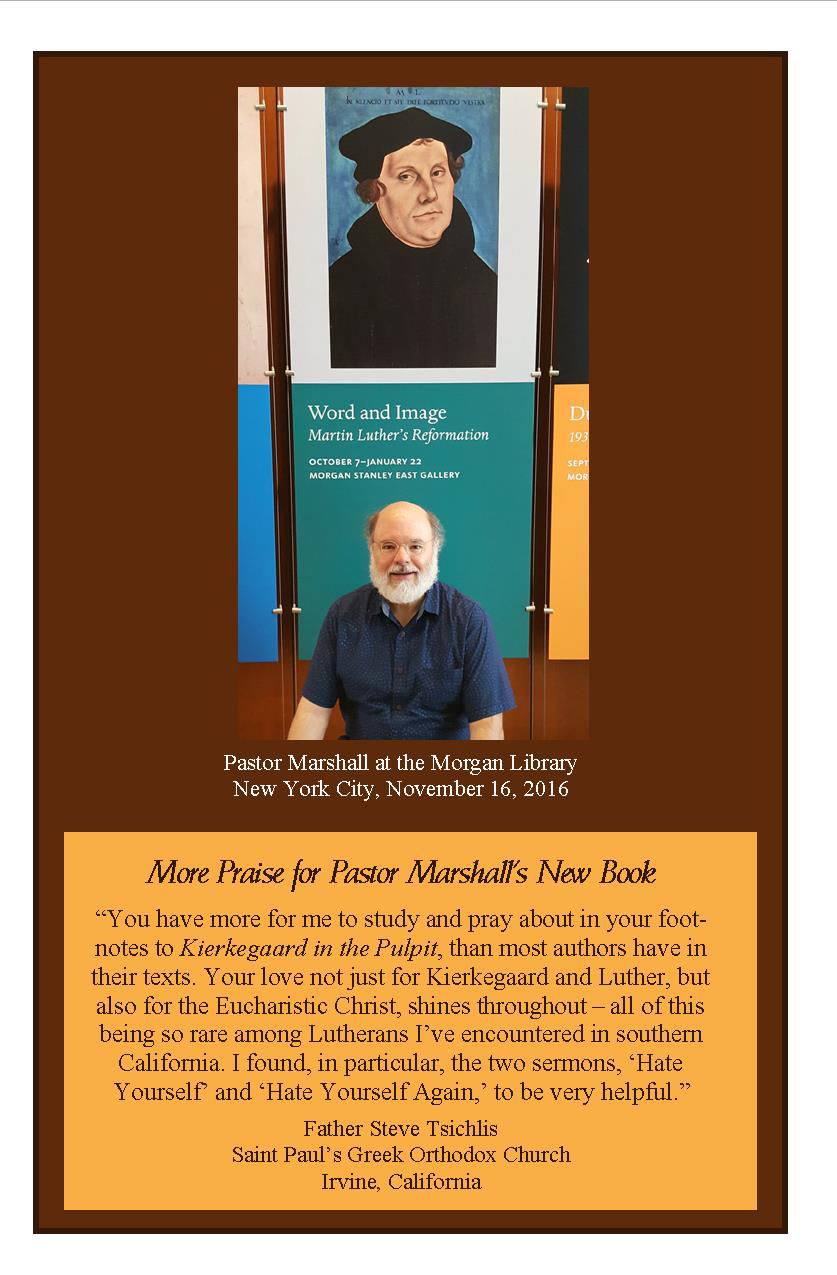 |
|
Nehemiah 9.32
Monthly Home Bible Study,
February 2017, Number 288
The Reverend Ronald F. Marshall
Along with our other regular study of
Scripture, let us join as a congregation in this home study. We
will study alone then
talk informally about the assigned verses together as we have
opportunity. In this way we can "gather
together around the
Word" even though physically we will not be getting together
(Acts 13.44). (This study uses the RSV translation.) We need to support each other in this
difficult project. In 1851 Kierkegaard wrote that the Bible is
"an extremely dangerous book.... [because] it is an imperious
book... – it takes the whole man and may suddenly and radically
change... life on a prodigious scale" (For
Self-Examination). And in 1967 Thomas Merton wrote that "we
all instinctively know that it is dangerous to become involved
in the Bible" (Opening
the Bible). Indeed this word "kills" us (Hosea 6.5) because
we are "a rebellious people" (Isaiah 30.9)! As Lutherans,
however, we are still to "abide in the womb of the Word" (Luther's
Works 17.93) by constantly "ruminating on the Word" (LW
30.219) so that we may "become like the Word" (LW
29.155) by thinking "in the way Scripture does" (LW
25.261). Before you study, then, pray: "Blessed Lord, who caused
all holy Scriptures to be written for our learning: Grant us so
to hear them, read, mark, learn, and inwardly digest them, that
we may embrace and ever hold fast the blessed hope of
everlasting life, which you have given us in Our Savior Jesus
Christ. Amen" (quoted in R. F. Marshall,
Making A New World: How
Lutherans Read the Bible, 2003, p. 12). And don’t give up,
for as Luther said, we “have in Scripture enough to study for
all eternity” (LW
75:422)!
Week I.
Read Nehemiah 9.32 noting the word
hardship. What were
these hardships? On this read Nehemiah 9.36 noting the word
slaves. What’s so bad
about being a slave? On this read Nehemiah 9.37 noting the words
goes,
over,
bodies,
cattle and
distress. So slaves
lose riches and are afflicted with bodily pain. Note that some
of that pain was inflicted at the
pleasure of the
masters – suggesting sadistic beatings, overwork and even rape.
On this bodily pain read Job 2.7–3.26 noting two things. First
that Job’s bodily suffering was very great (Job 2.13). And
secondly that Job did not sin
with his lips (Job
2.10) – in contradistinction to the thorough exoneration in Job
1.22, and the divine blessing in Job 1.21. That implies that
there was unspoken sin in his heart – because after successfully
enduring the first onslaught, he caves in under the severe
physical pain. Now after knowing these hardships and physical
traumas, why would Israel sin again? On this read Nehemiah 9.28
noting the line after
they had rest. Did that rest block the memory of physical
pain which had been keeping them from further rebellion and punishment? On this read Hosea
13.6 noting the confirming correlation of the two words
filled and
forgot. What makes
this correlation a confirmation that rest leads to amnesia? Go
back to Hosea 13.6 and note the word
therefore. Are you
now convinced? Why or why not?
Week II.
Read again Nehemiah 9.32 noting the same word
hardship. Why was the
hardship of slavery inflicted upon God’s people in the first
place? On this read Nehemiah 9.16–17, 26 noting the words
stiffened,
refused,
mindful,
killed and
blasphemies. Why were
these violations so heinous? On this read Exodus 20.1–17, noting
the severe consequence –
visiting iniquity… to the fourth generation. What warrants
this severity? On this read Exodus 34.6–8 noting the words
abounding and
bow. What do these
words say about God? On this read Psalm 99.1–5 noting the words
tremble,
mighty and
footstool. Does this
add up to seeing that when God is dishonored there is hell to
pay? Is the brutal enslavement warranted then? How so if so?
Week III.
Reread Nehemiah 9.32 noting the line
seem little to thee.
Why would God not care about these hardships? On this read
Nehemiah 9.38 noting the line
because of all this, we
make a firm covenant. Does this imply instability and
fickleness on the part of God’s people? If so, how do they plan
to turn over a new leaf? Will making a firm covenant do it? Will
it also convince God that this time Israel will not disrespect
him? On this read Ezekiel 11.19–20 noting the words
I,
new,
keep,
obey and
my. Does Israel in
Nehemiah know that it cannot keep a covenant all by itself? It
does seem to know that the reason God doesn’t care if Israel
suffers is because they are repeat offenders – breaking
covenants left and right. On this read Deuteronomy 8.17 noting
the line my power… has
gotten me this wealth. Does the same bravado hold here in
Israel?
Week IV.
Read Nehemiah 9.32 one last time noting the words
keepest and
terrible. What do
these two words say about Israel’s prospects of keeping the new
covenant? On the first word read 2 Timothy 2.13 noting the words
if,
faithless and
faithful. By
conceding that God keeps his covenant, lifts all blame from God.
It shows that we don’t blame our foibles on his lack of concern
for us. And on the second word, read Psalm 99.3 noting the
connection between the words
terrible and
praise. Terror, then,
is not a reason to run from God, but to praise him. He is
fearsome and mighty and will punish us if provoked by our
rebellion. Conceding this connection also shows God our good
faith. Will that please God? On this read Hebrews 11.6 noting
the words faith,
please,
rewards and
seek. Does that mean
we can manipulate God to favor us? On this read John 6.44 noting
the word draw, and
John 15.5 noting the word
apart. Do those words gut any manipulation on our part? If
so, how so? |
February Book
_________________________________________________________________________________________________________________
With the Mind:
Readings in Contemporary Theology
3-5 pm in the Church Lounge, Saturday, February 27th.
The book for February is
Yawning at Tigers: You Can’t Tame God, So Stop Trying (2014)
by Drew Dyck, a theologically trained author and editor. His
book attempts to feed those “starving for the awe of God” (p.
ix). It wants to rectify “rarely” hearing anything of God’s
mystery, majesty, and wrath (p. 3). He would like to convince
his readers to put up signs outside their churches saying:
BEWARE THE GOD
(p. 9). He wants to reintroduce to churches the “fainters” that
abound in the Bible (p. 28) – like John on Patmos and Isaiah in
the temple of old. He wants to get rid of the God portrayed in
movies as a comfortable “avuncular presence” (p. 28). He
believes the “Bible makes God strange” (p. 39), and so he also
wants to do that through the “holy disorientation” (p. 37) his
book uncovers.
A copy of this unusually fine book is in the library. If you
would like to purchase one for yourself, contact Pastor
Marshall. Feel free to attend our meeting when we discuss the
holy disorientation explored in this book.
Saint Paul
|
The Presentation
of Our Lord —
On Thursday, February 2nd we
celebrate
The Presentation of our Lord
at 11:45 am in the chapel with Holy Eucharist.
This feast day revolves around a
prophecy in Luke 2:34-35 that relates a stirring story about
Christ’s ministry.
It says he will be spoken against,
and that he will cause the rise and fall of many.
Honor God this day for the wisdom
in this prophecy.
 |
Remember in prayer before God those whom He has made your
brothers and sisters through baptism.
Dean Walter Hard, Marlis Ormiston, Ken Sund, Mariann Petersen,
Evelyn Coy, Eileen Nestoss, Tabitha Anderson, Leah Baker, Bob &
Barbara Schorn, Celia Balderston, The PLU Music Faculty, Mike
Harty, Heidi Anderson, Jordan Corbin, Jim Moe, Matt Anderson,
Sheila Feichtner, Linda Anderson, Margeen & Chris Boyer, Linda
Hagen, Iris Hansen Tate, Doug Rozmyn, Nell & Paul Sponheim,
Susan Armbrewster, Stan & Doreen Phillips, The Rev. Kari Reiten,
The Rev. Keith Krebs, Laura Coy, John Matthiesen, Therese
Mannella those infants and families affected by the Zika virus,
the great migration from the Near East into Europe and other
parts of the world.
Pray for those who have suffered the death of a loved one: Pray
that God will bear their grief and lift their hearts:
Pray for the family and friends of
Rollie
Storbakken and family on the death of his Mother-in-law,
Dorothy Chase.
Pray for the shut-ins that the light of Christ may give them
joy: Florence Jenkins, C. J. Christian, Louis Koser, Anelma
Meeks, Dorothy Ryder, Lillian Schneider, Crystal Tudor, Nora
Vanhala, Elmer & June Wittman, Bill Wright.
Pray for our bishops Elizabeth Eaton and Brian Kirby Unti, our
pastor Ronald Marshall, our deacon Dean Hard and our cantor
Andrew King, that they may be strengthened in faith, love and
the holy office to which they have been called.
Pray that God would give us hearts which find joy in service and
in celebration of Stewardship.
Pray that God would work within you to become a good
steward of your time, your talents and finances.
Pray to strengthen the Stewardship of our congregation in
these same ways.
Pray for the hungry, ignored, abused, and homeless this
February. Pray for the mercy of God for these people, and for
all in Christ's church to see and help those who are in
distress.
Pray for our sister congregation:
El Camino de Emmaus in the Skagit Valley that God may
bless and strengthen their ministry.
Also, pray for our parish and it's ministry.
Pray that God will bless you through the lives of the saints:
Martin Luther, Renewer of the Church, 1546; Saint Matthias,
Apostle.
|

